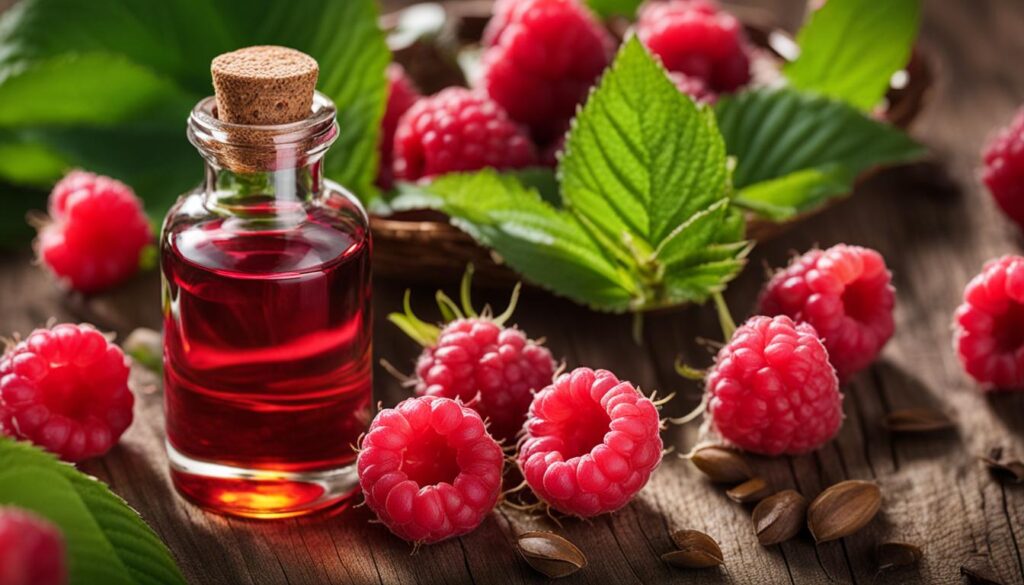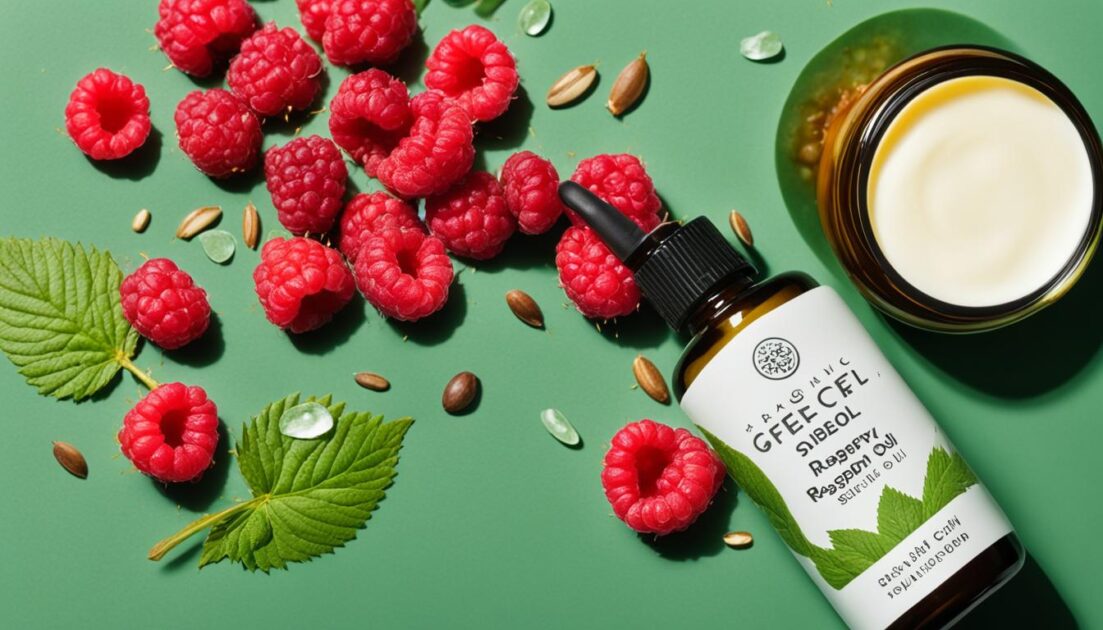Raspberry seed oil is a powerful natural oil with numerous uses and benefits for the skin and hair. Rich in essential fatty acids and vitamins, this versatile oil offers remarkable skincare and anti-aging properties. From moisturizing and nourishing the skin to promoting hair health, raspberry seed oil is a valuable addition to any beauty and wellness routine.
Key Takeaways:
- Raspberry seed oil is rich in essential fatty acids and vitamins, making it a nourishing and hydrating oil for the skin and hair.
- It offers numerous skincare benefits, including protecting against free radicals, reducing inflammation, and promoting healthy skin cell regeneration.
- Raspberry seed oil can be used in various skincare and haircare products, such as serums, moisturizers, masks, and shampoos.
- It has anti-aging properties that help reduce the appearance of fine lines, wrinkles, and age spots.
- Raspberry seed oil can also be used in culinary and household applications, adding flavor to dishes and serving as a natural wood polish.
The History and Origin of Raspberry Seed Oil
Raspberry seed oil has a rich history and origins that date back centuries. Derived from the seeds of the raspberry fruit, this oil has been used for its medicinal and therapeutic properties in various cultures across the world.
While the exact origins of raspberry seed oil are not clear, it is believed to have originated in Europe and North America. Native American tribes, such as the Cherokee and Iroquois, utilized raspberry seed oil in traditional herbal remedies to treat a range of ailments.
“Raspberry seed oil has been used for centuries in herbal medicine for its remarkable healing properties.”
With the passage of time, raspberry seed oil gained recognition for its exceptional skincare benefits. Today, it is widely used in the beauty industry and has become a popular ingredient in skincare products due to its nourishing and protective properties.
Overall, the history and origin of raspberry seed oil showcase its long-standing presence in natural medicine and its journey to becoming a sought-after ingredient in the skincare and beauty realm.
Properties and Key Components of Raspberry Seed Oil
Raspberry seed oil offers a wide range of beneficial properties and is enriched with key components that contribute to its remarkable skincare and anti-aging benefits. This natural oil is packed with essential fatty acids, including linoleic acid and alpha-linolenic acid, which deeply moisturize and nourish the skin, leaving it soft, supple, and hydrated. These essential fatty acids also help to strengthen the skin’s natural barrier, preventing moisture loss and promoting overall skin health.
In addition to its nourishing fatty acids, raspberry seed oil is also a rich source of antioxidants, such as vitamin E and ellagic acid. These antioxidants play a crucial role in protecting the skin against oxidative stress caused by environmental factors like UV radiation and pollution. By neutralizing free radicals and reducing inflammation, antioxidants help to combat signs of aging, including fine lines, wrinkles, and age spots, resulting in a more youthful and radiant complexion.
Furthermore, the presence of ellagic acid in raspberry seed oil provides additional benefits for the skin. Ellagic acid has been found to have anti-inflammatory properties, making it especially effective in soothing and calming irritated and sensitive skin conditions. Whether you’re dealing with redness, inflammation, or skin conditions like eczema or psoriasis, raspberry seed oil can help to alleviate discomfort and promote a healthier-looking complexion.
Raspberry seed oil’s unique combination of essential fatty acids and antioxidants makes it a standout choice for natural skincare routines. Its deeply nourishing qualities, coupled with its ability to protect against environmental damage and inflammation, make it an excellent option for those seeking a holistic and effective approach to skincare.
Culinary and Personal Product Uses of Raspberry Seed Oil

Raspberry seed oil is a versatile ingredient that goes beyond skincare and haircare. It can also delight your taste buds and enhance your personal care routine. Here are some exciting culinary and personal product uses of raspberry seed oil:
Culinary Uses
- Flavorful Dishes: Add a touch of raspberry essence to your culinary creations by incorporating raspberry seed oil as a flavoring agent. Its subtle raspberry flavor can elevate desserts, sauces, dressings, and more.
- Baking Enhancer: When baking, replace traditional oils with raspberry seed oil to infuse your cakes, cookies, and muffins with a unique raspberry twist. The result? Delicious treats that are both flavorful and nutritious.
- Salad Dressings: Create vibrant and refreshing salad dressings by blending raspberry seed oil with your favorite herbs, spices, and vinegar. It adds a delightful fruity note that complements a variety of greens.
Personal Product Uses
- Skincare Marvel: Harness the nourishing properties of raspberry seed oil by incorporating it into your skincare routine. It can be used as a key ingredient in soaps, lotions, and lip balms to provide deep hydration and promote healthy-looking skin.
- Hydrating Haircare: Give your hair an extra boost of hydration by incorporating raspberry seed oil into your hair products. It helps to condition and soften the hair, leaving it looking lustrous and manageable.
- DIY Beauty Recipes: Create your own personalized beauty products by adding raspberry seed oil to DIY recipes. From face masks to body scrubs, this versatile oil can enhance the nourishing benefits of your homemade creations.
So, whether you want to tantalize your taste buds or elevate your personal care routine, raspberry seed oil is a valuable ingredient to have on hand. With its culinary and personal product uses, this versatile oil adds a delightful touch to your everyday experiences.
Household and Other Topical Uses of Raspberry Seed Oil

Raspberry seed oil is not only beneficial for the skin and hair, but it also has a range of practical household applications. Its natural and nourishing properties make it a safe and effective alternative to chemical-based household products. Here are some common household uses of raspberry seed oil:
- Wood Polish and Conditioner: Raspberry seed oil can be used as a natural wood polish and conditioner. Apply a small amount of oil to a clean cloth and gently rub it onto wooden furniture or surfaces. The oil will help restore shine and nourish the wood, leaving it looking revitalized.
- Door and Hinge Lubricant: If you have squeaky doors or rusty hinges, raspberry seed oil can come to the rescue. Apply a few drops of oil to the hinges or areas that require lubrication, and gently work it in. The oil’s natural lubricating properties will help reduce friction and eliminate annoying squeaks.
“Using raspberry seed oil as a natural polish for wooden furniture not only provides a beautiful shine but also helps protect and nourish the wood.”
| Household Uses of Raspberry Seed Oil | Benefits |
|---|---|
| Wood Polish and Conditioner | Restores shine and nourishes wood |
| Door and Hinge Lubricant | Reduces friction and eliminates squeaks |
Skincare Benefits and Application of Raspberry Seed Oil

Raspberry seed oil is a powerhouse ingredient for skincare, offering a multitude of benefits for your skin. From protecting against environmental damage to soothing inflammation, this natural oil is a valuable addition to your skincare routine.
High Antioxidant Content for Skin Protection
The high antioxidant content of raspberry seed oil helps to shield your skin from harmful free radicals and environmental stressors. These antioxidants neutralize the damaging effects of oxidative stress, preventing premature aging and keeping your skin looking youthful and radiant.
Anti-Inflammatory Properties for Soothing Irritated Skin
Raspberry seed oil is also known for its anti-inflammatory properties, making it an ideal choice for those who struggle with sensitive or irritated skin conditions such as eczema and psoriasis. By soothing inflammation and reducing redness, raspberry seed oil helps to calm and restore balance to your skin.
Direct Application and Skincare Product Incorporation
There are multiple ways to incorporate raspberry seed oil into your skincare routine. You can apply it directly to your skin as a moisturizer or serum, gently massaging it into your face and body. For enhanced benefits, you can also look for skincare products that contain raspberry seed oil as an ingredient, such as moisturizers, masks, or serums.
Healthy Skin Cell Regeneration and Anti-Aging Effects
Regular use of raspberry seed oil promotes healthy skin cell regeneration, helping to keep your skin looking fresh and vibrant. It also helps to reduce the appearance of fine lines, wrinkles, and other signs of aging, thanks to its nourishing and rejuvenating properties.
Overall, raspberry seed oil is a versatile and beneficial skincare ingredient, offering protection, nourishment, and anti-aging benefits. Whether you choose to apply it directly to your skin or incorporate it into skincare products, this natural oil can help you achieve healthy and radiant skin.
Anti-Aging Benefits of Raspberry Seed Oil

Raspberry seed oil is an exceptional ingredient for combating the signs of aging and promoting a youthful complexion. This powerhouse oil is rich in antioxidants and essential fatty acids that work together to protect and nourish the skin.
As we age, our skin naturally loses elasticity, resulting in fine lines, wrinkles, and age spots. However, regular use of raspberry seed oil can help reverse these effects and restore a more youthful appearance.
The high levels of antioxidants in raspberry seed oil fight against free radicals, which can cause premature aging and damage to the skin. These antioxidants help to neutralize these harmful particles and reduce oxidative stress, promoting healthier and younger-looking skin.
“Regular use of raspberry seed oil can improve skin elasticity, boost collagen production, and promote a more youthful complexion.”
In addition to antioxidants, raspberry seed oil is packed with essential fatty acids like omega-3 and omega-6. These fatty acids deeply nourish the skin, keeping it hydrated and supple. They also support the skin’s natural barrier function, preventing moisture loss and maintaining optimal skin health.
One of the key benefits of raspberry seed oil is its ability to stimulate collagen production. Collagen is essential for maintaining the skin’s firmness and elasticity. By boosting collagen synthesis, raspberry seed oil helps to plump the skin, reducing the appearance of wrinkles and fine lines.
Using raspberry seed oil as part of your anti-aging skincare routine can lead to remarkable results. Whether applied directly to the skin or incorporated into facial serums, moisturizers, or masks, the nourishing properties of raspberry seed oil can improve skin texture, minimize the signs of aging, and promote a radiant and youthful complexion.
Raspberry Seed Oil for Hair

In addition to its skincare benefits, raspberry seed oil offers remarkable advantages for hair health. With its nourishing properties, this versatile oil effectively moisturizes and conditions the hair, resulting in softness and manageability. Incorporating raspberry seed oil into your hair care routine can promote hair growth, reduce hair loss, and improve the overall appearance and texture of your hair.
Raspberry seed oil can be used in various ways to enhance the health and beauty of your hair. One method is to use it as a hair mask by applying the oil generously to damp hair, focusing on the ends. Leave it on for 30 minutes to an hour before rinsing it out thoroughly. This treatment helps to deeply nourish and hydrate the hair, leaving it revitalized and silky.
Another way to incorporate raspberry seed oil into your hair care regimen is by using it as a scalp treatment. Gently massage a small amount of the oil onto your scalp, paying attention to areas that may be dry or experiencing hair loss. This can help nourish the scalp, stimulate blood circulation, and promote healthy hair growth.
For added convenience and ease, you can also mix a few drops of raspberry seed oil with your regular shampoo and conditioner. This allows you to enjoy the nourishing benefits of the oil with every wash, helping to improve the overall health and appearance of your hair over time.
Regular use of raspberry seed oil can help repair damaged hair, reduce frizz, and restore shine. Its natural properties, including its high levels of essential fatty acids and antioxidants, work together to nourish the hair follicles, strengthen the hair shaft, and protect against environmental damage.
Usage Tips and Cautions for Raspberry Seed Oil

When it comes to using raspberry seed oil, there are a few tips and cautions to keep in mind for a safe and effective experience.
Perform a Patch Test
Before applying raspberry seed oil to a larger area of your skin, it is highly recommended to perform a patch test. Apply a small amount of the oil to a small patch of skin and observe for any allergic reactions or irritation. This step is crucial, especially if you have sensitive skin.
Using Raspberry Seed Oil
Raspberry seed oil can be used in a variety of ways. It can be applied directly to the skin as a moisturizer or mixed with other carrier oils or essential oils for added benefits. Experiment with different combinations to find the best formula for your skin’s needs.
Storage and Shelf Life
To ensure the longevity and quality of your raspberry seed oil, proper storage is essential. Keep the oil in a cool, dark place, away from direct sunlight and heat sources. This will prevent oxidation and keep the oil’s beneficial properties intact. It is also recommended to store the oil in a tightly sealed dark glass bottle for optimal preservation.
Consult with a Dermatologist
While raspberry seed oil is generally safe for most skin types, it’s always a good idea to consult with a dermatologist or skincare professional before incorporating it into your routine. They can provide personalized advice and guidance based on your specific skin needs and concerns.
By following these usage tips and cautions, you can enjoy the full benefits of raspberry seed oil while keeping your skin healthy and safe.
| Tips for Using Raspberry Seed Oil | Cautions for Using Raspberry Seed Oil |
|---|---|
| Perform a patch test before applying to larger areas of skin. | Consult with a dermatologist before use. |
| Use raspberry seed oil on its own or mix with carrier oils or essential oils. | Avoid using if you have known allergies to berries or seeds. |
| Store raspberry seed oil in a cool, dark place to prevent oxidation. | Discontinue use if you experience any adverse reactions. |
Selecting the Best Quality Raspberry Seed Oil
When it comes to purchasing raspberry seed oil, selecting a high-quality product is essential to reap its maximum benefits. Here are some tips to help you choose the best quality raspberry seed oil:
- Look for Cold-Pressed and Organic Oils: Cold-pressed oils retain more of the natural nutrients and properties of the raspberry seeds. Organic oils are free from harmful chemicals and pesticides, ensuring a pure and safe product.
- Verify Certifications and Third-Party Lab Testing: Check for certifications such as USDA Organic, which guarantee the authenticity and quality of the oil. Look for oils that have undergone third-party lab testing to ensure purity and potency.
- Read Customer Reviews: Reading reviews from other customers can provide valuable insights into the overall quality and effectiveness of the raspberry seed oil. Look for reviews from reputable sources or platforms to get an accurate representation of the product.
- Research Reputable Brands: Invest time in researching and choosing brands with a proven track record in producing high-quality natural oils. Look for brands that prioritize sustainability, transparency, and ethical sourcing practices.
By following these tips, you can confidently select the best quality raspberry seed oil for your skincare and haircare needs, ensuring you receive the maximum benefits from this natural powerhouse.
Proper Storage of Raspberry Seed Oil

To maintain the quality and shelf life of raspberry seed oil, proper storage is essential. The oil should be stored in a cool, dark place away from direct sunlight and heat. Exposure to light and heat can cause the oil to degrade and lose its beneficial properties. It is recommended to keep the oil tightly sealed in a dark glass bottle to protect it from oxidation. Following these storage guidelines will ensure that the raspberry seed oil remains fresh and effective for an extended period.
Proper storage is crucial in preserving the quality and efficacy of raspberry seed oil. By following the correct storage methods, you can ensure that the oil retains its nourishing and skincare benefits for a longer duration.
Conclusion
Raspberry seed oil is a true beauty powerhouse with a multitude of uses and benefits for both your skin and hair. Whether you’re looking to improve your skincare routine, slow down the signs of aging, indulge in culinary delights, or explore its household applications, raspberry seed oil has got you covered.
With its natural nourishing properties and rich antioxidant content, raspberry seed oil is a fantastic all-natural solution for addressing various beauty concerns. Its versatility allows you to incorporate it seamlessly into your daily regimen, providing a boost of hydration, protection, and rejuvenation.
From promoting healthy skin cell regeneration and reducing inflammation to moisturizing and conditioning your hair, raspberry seed oil offers a holistic approach to your beauty and wellness needs. Embrace the power of this remarkable oil and unlock its natural beauty benefits for a radiant and healthy glow from head to toe.
FAQ
What are the uses and benefits of raspberry seed oil?
Raspberry seed oil has numerous uses and benefits for the skin and hair. It is a nourishing oil that moisturizes and nourishes the skin, reduces the signs of aging, soothes irritated skin conditions, promotes healthy hair, and even has culinary uses.
Where does raspberry seed oil come from?
Raspberry seed oil is derived from the seeds of the raspberry fruit. While its exact origins are unclear, it is believed to have originated in Europe and North America.
What are the key components of raspberry seed oil?
Raspberry seed oil is rich in essential fatty acids, such as linoleic acid and alpha-linolenic acid, which provide moisturizing and nourishing properties. It also contains antioxidants, including vitamin E and ellagic acid, which fight against oxidative stress and inflammation.
How can raspberry seed oil be used in culinary and personal products?
Raspberry seed oil can be used as a flavoring agent in various dishes, adding a subtle raspberry flavor. It is also used in personal care products like soaps, lotions, and lip balms to provide nourishment and hydration to the skin.
What are some household uses of raspberry seed oil?
Raspberry seed oil can be used as a natural wood polish and conditioner, giving furniture and wooden surfaces a beautiful shine. It can also be used as a lubricant for rusty hinges or squeaky doors.
What are the skincare benefits of raspberry seed oil?
Raspberry seed oil offers numerous skincare benefits. It helps protect the skin from free radicals and environmental damage, soothes irritated and inflamed skin conditions, promotes healthy skin cell regeneration, and improves overall skin health.
Does raspberry seed oil have anti-aging properties?
Yes, raspberry seed oil has anti-aging properties. It reduces the appearance of fine lines, wrinkles, and age spots, improves skin elasticity, boosts collagen production, and promotes a more youthful complexion.
How can raspberry seed oil benefit the hair?
Raspberry seed oil moisturizes and conditions the hair, making it softer and more manageable. It can also promote hair growth, reduce hair loss, and improve the overall appearance and texture of the hair.
Are there any tips for using raspberry seed oil?
It is recommended to perform a patch test before applying raspberry seed oil to a larger area of the skin to check for any allergic reactions. Raspberry seed oil can be used on its own or mixed with other carrier oils or essential oils for added benefits.
How can I select the best quality raspberry seed oil?
When purchasing raspberry seed oil, choose a high-quality product that is cold-pressed and organic. Look for certifications or third-party lab testing to ensure purity and authenticity. Reading customer reviews and researching reputable brands can also help in selecting the best quality oil.
How should raspberry seed oil be stored?
Raspberry seed oil should be stored in a cool, dark place away from direct sunlight and heat. It is recommended to keep the oil tightly sealed in a dark glass bottle to protect it from oxidation.






